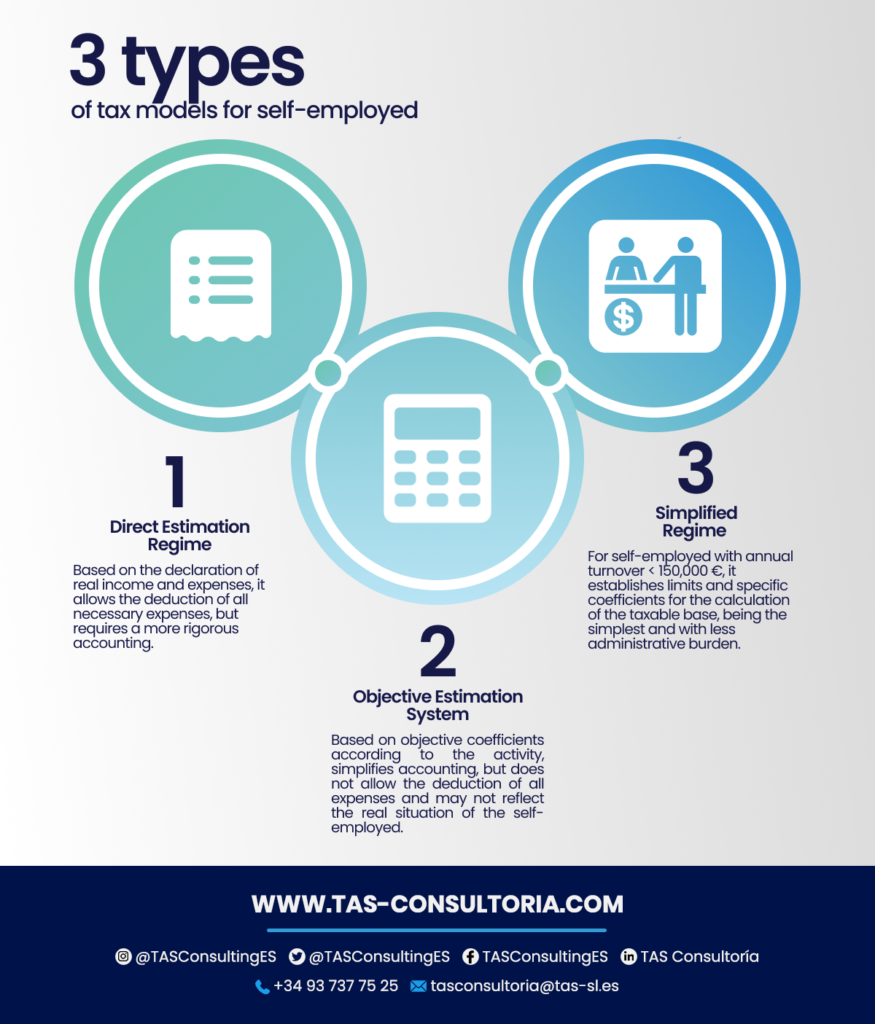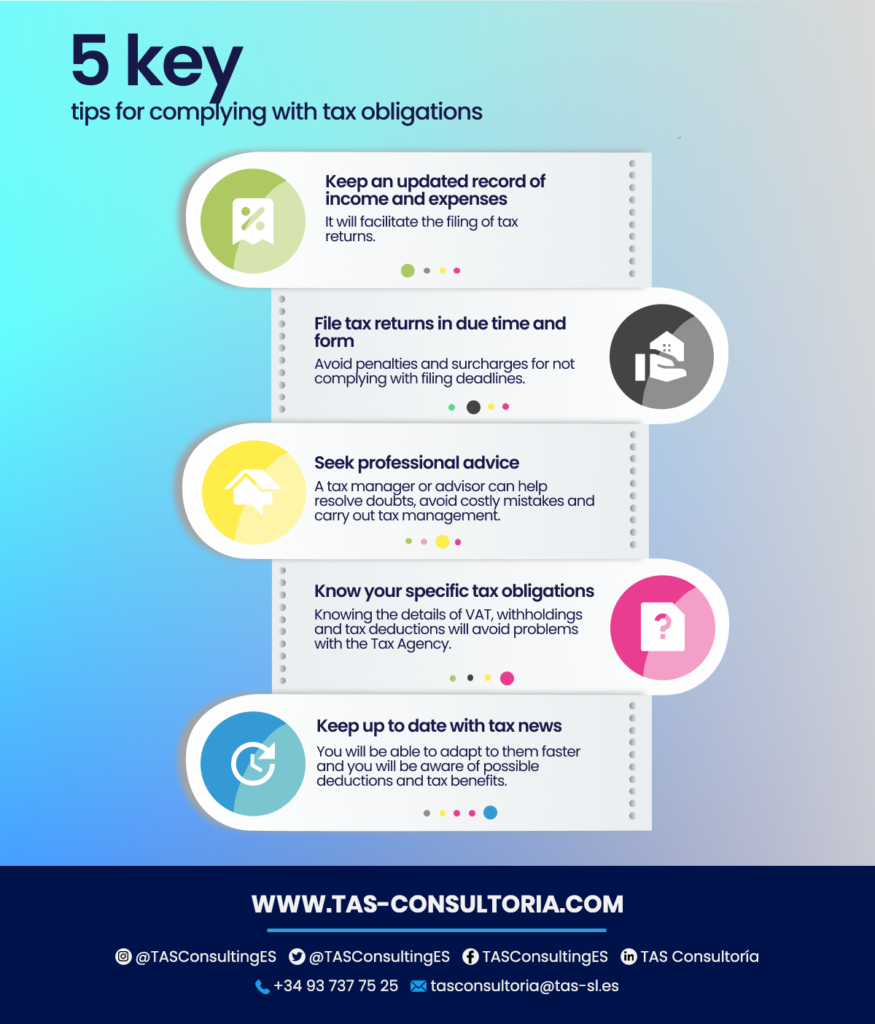
If you are self-employed in Spain, you will know how important it is to comply with your tax obligations. One of the most relevant aspects in this regard is to choose the right tax model for your activity. For this, there are different options, each with its own characteristics, advantages and disadvantages, so it is essential to know them well to choose the one that best suits your situation. Read on to find out the details!
What are the types of tax forms that every self-employed person should be aware of?
The self-employed, like any company, are subject to a series of tax obligations. These obligations may vary depending on the tax model to which they are subject. Below, we detail the main tax models that exist for the self-employed:

You may also be interested in: Tax obligations for the self-employed in Spain 2022
Direct Estimation Regime
This regime or tax model is based on the declaration of the self-employed person’s actual income and expenses. The taxable income is determined by subtracting the deductible expenses from the income obtained during the fiscal year.
- Advantages: it allows the deduction of all expenses necessary for the activity, which can significantly reduce the tax burden. It is the most suitable regime for those self-employed with high deductible expenses.
- Disadvantages: requires more detailed and rigorous accounting. As a freelancer you must keep complete accounting and be up to date with tax obligations.
Objective Estimation Regime
This regime or tax model is based on objective rates that are established according to the activity carried out by the self-employed. In this case, the taxable base is determined by applying coefficients to the income obtained during the fiscal year.
- Advantages: Simplifies your accounting as a freelancer. Requires less time and resources (especially money) for bookkeeping.
- Disadvantages: the coefficients are established based on an average of the activity. This can hide the real situation of the self-employed and does not allow the deduction of all the expenses necessary for the activity.
Simplified Regime
This regime or tax model applies to those self-employed persons who carry out a business activity with a turnover of less than 150,000 euros per year. Specific limits and coefficients are established for the calculation of the taxable base.
- Advantages: it is the simplest of the three regimes, since it requires the least administrative burden.
- Disadvantages: in the same way as the previous tax model, it does not allow the deduction of all the expenses necessary for the activity and the coefficients are established based on an average of the activity, which may not reflect your real situation as a self-employed person.
How to choose the right tax model?
Choosing the right tax model for self-employment requires evaluating a number of factors. It is of utmost importance to evaluate each of them carefully before making a decision, as choosing the wrong tax model can result in a higher tax burden and financial difficulties.
Therefore, we share with you some essential steps to make your selection process more successful. You must evaluate:
The type of activity you perform
The type of activity carried out by the self-employed is an important factor to consider when choosing the appropriate tax model. Each activity has different levels of deductible expenses and different coefficients that apply to the calculation of the taxable base.
Therefore, it is important to evaluate the particularities of the activity and choose the model that best suits it.
Revenue volume
Each tax model has its own limits and coefficients for the calculation of the taxable base. Consequently, you must assess whether, as a self-employed person, you are within the limits of the chosen regime and whether the coefficients are appropriate for your particular situation.
Deductible expenses
These are those expenses that can be subtracted from the income obtained during the fiscal year, thus reducing the tax burden. It is important to evaluate if you have high deductible expenses, since the Estimación Directa tax model is the most appropriate for this type of situation.
If deductible expenses are low, the Objective Estimation or Simplified regime may be more appropriate.
Your financial situation as a freelancer
If you have financial difficulties and need to reduce the tax burden to a minimum, the Direct Estimation regime may be the best option, since it allows the deduction of all the expenses necessary for the activity.
If you are looking to simplify accounting and save time or money, the Objective Estimation or Simplified regime may be more suitable for you.
Tax planning
It is important to consider long-term tax planning when choosing the right tax model. For example, if you plan to increase your income in the future, it may be beneficial to choose a regime that allows you to deduct more expenses, even if you do not currently have many deductibles.
You may also be interested in: Basic guide to importing into Spain
5 key tips for tax compliance
To succeed in your business as a freelancer, it is vital to comply with the tax obligations established by law. However, following the regulations of these obligations is not only a matter of responsibility and professional ethics, but also entails important legal and financial consequences.
If you do not comply with these obligations, you may face penalties and fines, as well as problems with the tax authorities. In addition, the right choice of your tax model as a freelancer can help you maintain a good reputation and credibility in the marketplace, which can be beneficial to your business in the long run.
So, in view of this scenario, take note of these tips to comply with your tax requirements:

You may also be interested in: What are the penalties imposed by the Tax Agency?
Choosing the right tax model is essential for any self-employed person in Spain. It is important to take into account factors such as the type of activity, income and deductible expenses to avoid tax problems and comply with tax obligations.
If you have any doubts or need help in choosing the right tax model for your business, our experts in tax management in Spain are at your disposal to provide you with the necessary advice. Don’t hesitate to ask for a consultation and make sure you comply with all your tax obligations efficiently!




Your email address will not be published .
Required fields are marked with *